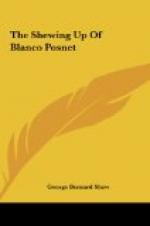THE COUNCIL OF TEN
Then the fat was in the fire. The majority, chaffed for its eagerness to obtain copies of scarce pamphlets retailable at five guineas, went dancing mad. When I presented myself, as requested, for cross-examination, I found the doors of the Committee room shut, and the corridors of the House of Lords filled by a wondering crowd, to whom it had somehow leaked out that something terrible was happening inside. It could not be another licensed play too scandalous to be discussed in public, because the Committee had decided to discuss no more of these examples of the Censor’s notions of purifying the stage; and what else the Committee might have to discuss that might not be heard by all the world was not easily guessable.
Without suggesting that the confidence of the Committee was in any way violated by any of its members further than was absolutely necessary to clear them from suspicion of complicity in the scene which followed, I think I may venture to conjecture what was happening. It was felt by the majority, first, that it must be cleared at all costs of the imputation of having procured more than one copy each of my statement, and that one not from any interest in an undesirable document by an irreverent author, but in the reluctant discharge of its solemn public duty; second, that a terrible example must be made of me by the most crushing public snub in the power of the Committee to administer. To throw my wretched little pamphlet at my head and to kick me out of the room was the passionate impulse which prevailed in spite of all the remonstrances of the Commoners, seasoned to the give-and-take of public life, and of the single peer who kept his head. The others, for the moment, had no heads to keep. And the fashion in which they proposed to wreak their vengeance was as follows.
THE SENTENCE
I was to be admitted, as a lamb to the slaughter, and allowed to take my place as if for further examination. The Chairman was then to inform me coldly that the Committee did not desire to have anything more to say to me. The members were thereupon solemnly to hand me back the copies of my statement as so much waste paper, and I was to be suffered to slink away with what countenance I could maintain in such disgrace.
But this plan required the active co-operation of every member of the Committee; and whilst the majority regarded it as an august and impressive vindication of the majesty of parliament, the minority regarded it with equal conviction as a puerile tomfoolery, and declined altogether to act their allotted parts in it. Besides, they did not all want to part with the books. For instance, Mr Hugh Law, being an Irishman, with an Irishman’s sense of how to behave like a gallant gentleman on occasion, was determined to be able to assure me that nothing should induce him to give up my statement or prevent him




